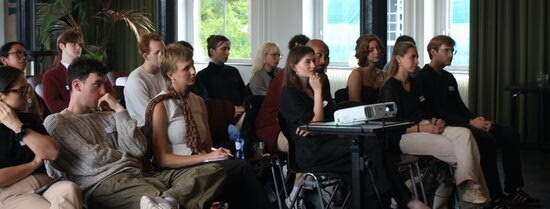Whether exposing far-right moral panics in Hungary, examining Israeli dominance over Palestinian life through architecture and healthcare, proposing how to decolonise graphic design or reimagining educational spaces, this year’s Connected Learning Symposium saw presenters transform their assignments and theses into eye-opening dialogue. For the fourth year, EUR students and recent alumni showcased the importance of social justice as an area of study in our curriculums.
On June 7th 2025, De Machinist welcomed more than 50 participants from 7 different EUR faculties (ESHCC, ESSB, RSM, ESE, ISS, ESPhil, ESL), Utrecht University College, and Delft University to hear about each other’s previous and ongoing work and expertise on issues of social (in)equality. They were welcomed by the co-organizers Dr. Isabel Awad and research intern Valentina Someso. Summarizing the expectations that participants themselves had mentioned when registering for the symposium, Isabel described this as an opportunity to “share ideas, propose vocabularies, learn and listen; receive feedback, meet changemakers, build new networks, explore collaborations and also make new friends”.
Interdisciplinary understanding and responsible impact
In interdisciplinary panel presentations, speakers discussed their research with fellow panelists and audience members in the hopes of understanding the inequalities that shape our lives and how citizens around the world attempt to fight them.
“The best aspect of the Learning for Equality Symposium for me was being in a space with so many diverse students with diverse perspectives, who all still have in common the drive to impact society positively,” said Lui Rommelspacher, a student in the research MA on Sociology of Culture, Media and the Arts (ESHCC), who presented their work on disability activist self-representation on Instagram.
Sharing interests and concerns while being able to approach them from different disciplinary perspectives is arguably key for today’s most pressing problems, which extend beyond the borders of any singular academic field. For Anne-Lotte Kunst, a Media, Culture and Society (ESHCC) graduate and returning participant, this leads to “new insights, new connections and a better understanding of our society.” Last year, Anne-Lotte presented her MA thesis research on Dutch modest fashion brands aimed at empowering women. This year she joined again to discuss the notion of authentic leadership in a panel on “Identity and (self)representation”.
Time to engage with each other
The diversity of perspectives brought by this year’s speakers was visible in all sessions, including, for example, the one on “Female resistance across systems of inequality.” Here, students from ESHCC, ESSB and RSM discussed various manifestations of gender inequality in online gaming, the German legal system’s treatment of gender-based violence victims, and the energy transition sector in the Netherlands. Lisa Ünsever, an MA student in Engaging Public Issues (ESSB), was a speaker in this panel. “I especially loved how much time we had for asking questions and engaging with each other,” she explained, describing the experience as “insightful” and “empowering”. As engagement between panelists and audience members is a major aspect of the symposium, a large part of each panel was reserved for Q&A interactions. Speaker presentations thus became the starting point for wider discussions on the panel’s theme, allowing participants to deepen their understanding through dialogue with one another.
Reclaiming educational spaces
Presenters critically engaged with a wide array of institutions, including schools and universities. In a panel dedicated to “Challenging educational structures,” participants from ESSB, ESHCC, and ISS pointed to blind spots in academic systems, where some students’ experiences are made invisible by design. From Sri Lanka to Rotterdam, panelists exposed how students who are queer, racialised, or have a given disability are excluded by inaccessible classrooms or curricula that ignore their realities.
The closing panel added to this discussion by underscoring the challenges faced by a group of students and lecturers from Delft University’s “Architecture and Colonialism” course, who studied the systematic use of spatial tools in colonial domination. At the symposium, a lecturer and a student from this course explained how this lens allowed them to scrutinise the mechanisms of violence, displacement, dehumanisation and silencing imposed by Israel on Palestinian life. They also showcased two of the student projects, which had been displayed at the public exhibition “Reclaiming space / Reclaiming narrative,” at Delft University.
The work of the “Architecture and Colonialism” students powerfully illustrated the importance of resisting institutional fears, censorship and complicity to secure possibilities for learning together and in solidarity, while contributing to the(re)construction of belonging and humanity. It is this kind of learning which Learning for Equality wants to foster, reminding our institutions of what is needed to create and sustain inclusive (learning) environments.
The Connected Learning Symposium is an annual event of the Learning for Equality project and is sponsored by Erasmus University’s Vital Cities and Citizens (VCC) initiative.
Learning for Equality Symposium 2025

The final programme of the Learning for Equality Symposium 2025
- More information
Vital Cities and Citizens
With the Erasmus Initiative Vital Cities and Citizens (VCC) Erasmus University Rotterdam wants to help improve the quality of life in cities. In vital cities, the population can achieve their life goals through education, useful work and participation in public life. The vital city is a platform for creativity and diversity, a safe meeting place for different social groups. The researchers involved focus on one of the four sub-themes:- Inclusive Cities and Diversity
- Resilient Cities and People
- Smart Cities and Communities
- Sustainable and Just Cities
VCC is a collaboration between Erasmus School of Social and Behavioural Sciences (ESSB), Erasmus School of History, Culture and Communication (ESHCC) and International Institute of Social Studies (ISS).




